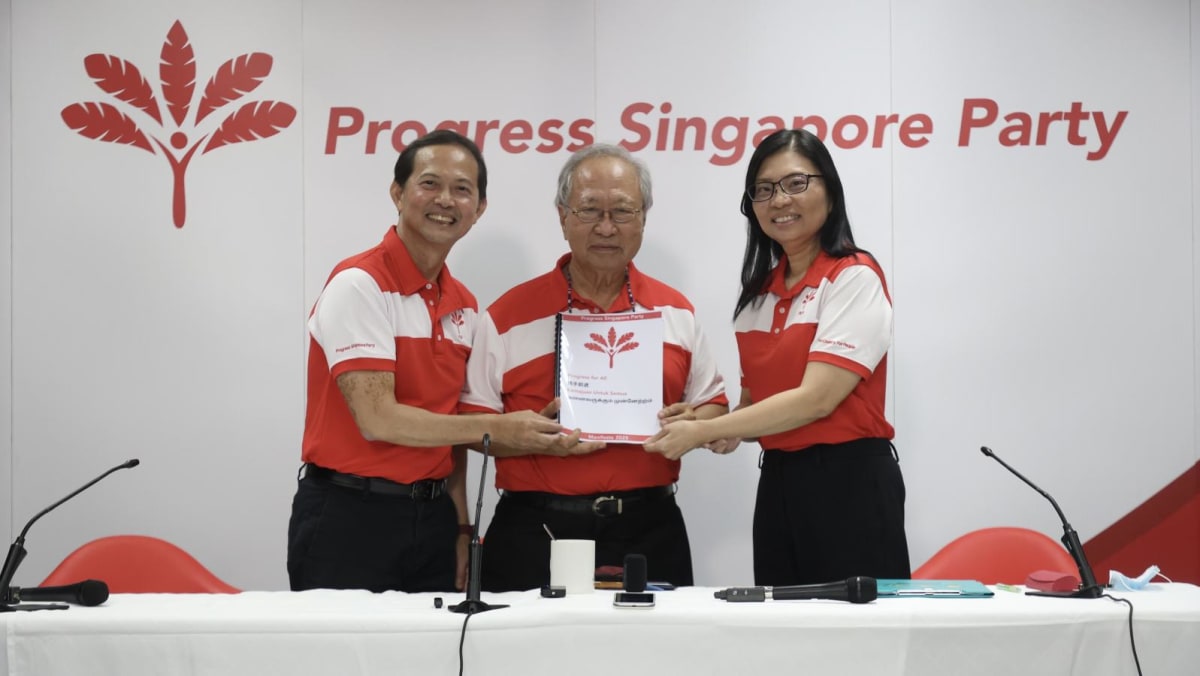Here’s a look at PSP’s key proposals in its manifesto for the next election:
COST OF LIVING
To address rising costs, the party recommended 11 policies – reducing the GST from 9 per cent back to 7 per cent and exempting essential items like rice, water and milk formula from the tax.
Cash support and utility rebates for lower- and middle-income Singaporeans can be funded by more progressive taxes such as estate duty or a wealth tax and not by GST, it said.
In addition, the party called for guidelines on rent increases for commercial properties, and reiterated its suggestion to phase out socially conscious enterprise hawker centres and set stall rentals at S$500 or 3 per cent of gross revenue, instead of the highest bid by tender.
Some Singaporeans should get more government-funded food discounts at all hawker centres, PSP said.
On healthcare, PSP wants the government to cover premiums for basic MediShield Life and CareShield Life and centralise drug procurement to lower costs. New mothers should receive a cash gift to offset confinement expenses, it said.
HOUSING
PSP suggested four measures to address high housing costs, including its previously proposed Affordable Homes Scheme – where BTO flat buyers defer paying land costs until they sell the flat.
The scheme has been criticised by Minister in the Prime Minister’s Office Indranee Rajah as a raid on Singapore’s reserves.
On Sunday, Mr Leong said PSP offers ideas on how to fund their policy recommendations. “Financial prudence is always part of our policy research, not like what the government has said, raiding the reserves and whatever they try and label us.”
The party repeated its proposal to allow singles to buy flats at age 28 and expand rental options for young adults in central locations under its Millennial Apartments Scheme. Other housing proposals include building more flats ahead of demand to shorten wait times.
GOVERNANCE AND TRANSPARENCY
The party proposed 15 measures to improve governance, citing insufficient “checks and balances” such as the Elections Department reporting to the Prime Minister and “costly mistakes” such as TraceTogether data being used for police investigations and the unmasking of NRIC numbers.
The party called for changes to ministerial salaries, MPs to publicly declare their assets and closed-door hearings for Temasek and GIC with MPs to improve accountability.
A Freedom of Information Act should be enacted and all documents older than 25 years automatically declassified. PSP also suggested changes to Singapore’s media landscape and the country’s fake news law, the Protection from Online Falsehoods and Manipulation Act (POFMA).
The party renewed its call to abolish the Group Representation Constituency (GRC) scheme, pointing to some MPs riding “on the coattails” of others and to vacancies left unfilled in GRCs after MPs resigned.
It proposed an NCMP scheme for minorities or a hybrid electoral system to ensure multi-racial representation in parliament instead.
PSP said it wants how electoral boundaries are decided to change. It also proposed that the People’s Association be depoliticised, the Speaker of Parliament be non-partisan and the voting age be lowered to 18.
JOBS AND WAGES
While reaffirming Singapore’s need for foreign talent, PSP called for stronger protections for local workers. It proposed 15 measures such as a minimum wage of S$2,250 (US$1,680) for Singapore workers, a company quota for Employment Pass (EP) holders with a levy of S$1,200 per month and to increase the EP qualifying salary to S$10,000.
To “minimise the risk of discriminatory practices”, the government should ensure companies do not have too many work pass holders from the same foreign country, PSP said.
The party recommended better safeguards against non-compete clauses for retrenched workers, increasing the minimum paid annual leave to 14 days a year, designating more public holidays and implementing a “right to disconnect” policy.
SOCIAL SAFETY NET
PSP proposed eight changes related to social safety nets, such as consolidating and simplifying the existing network of over 60 support schemes. The current system is confusing and challenging for Singaporeans who are less proficient in English or do not have the time or energy to apply for them, it said.
It suggested government-paid allowances for full-time caregivers of Singaporean children below seven years old, and wider MediSave use for outpatient and reproductive health services – maternity care and elective egg freezing.
For older Singaporeans, PSP wants to double Silver Support Scheme payouts and ensure that the Pioneer Generation and Merdeka Generation Funds are fully utilised.
It also proposed a CPF Lifetime Retirement Investment scheme to allow Singaporeans to invest some of their savings in investment products managed by the CPF Board.
EDUCATION
The party called for eight changes in Singapore’s education system, such as a 10-year through-train programme that makes the Primary School Leaving Examination (PSLE) optional.
It advocated less reliance on summative examinations, and urged for more vocational and non-academic routes to university.
The party proposed that class sizes be reduced and that smaller schools not be merged and closed. Such schools could offer non-PSLE routes or cater to children whose needs are unaddressed in bigger classes.
To manage student and teacher well-being, it proposed regular mental health monitoring and feedback mechanisms.
Tuition grants and scholarships available to foreign students should be reduced, PSP said. No Singaporean student should “be displaced” from an institute of higher learning because of an international student, and autonomous universities should always have enough places to cater to Singaporean students, its manifesto said.
